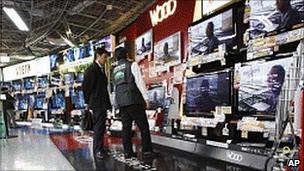Japan deflation slows on rising food and fuel costs
- Published

Japanese deflation has slowed in January buoyed by high food and fuel costs.
Consumer prices fell 0.2% in January from December, the statistical office said. Prices were unchanged from a year earlier.
However, analysts said deflation was still a problem, adding the economy was still in the early stages of recovery.
When fuel and food costs are excluded, consumer prices fell at an annual rate of 0.6%.
"The headline numbers are being distorted by commodity prices," said Richard Jerram of Macquarie Group.
"The underlying trend is not particularly encouraging...In general it shows deflation is moderating, but not going away."
Staying the course
As a result, many analysts say they do not foresee the Bank of Japan (BOJ) changing its monetary policy any time soon, and expect it to keep interest rates on hold.
The BOJ cut interest rates to almost zero last year.
It has said it will keep them at that level until consumer price growth returns, and the rate of inflation nears 1%.
The BOJ has forecast that the economy will pick up pace later this year, and that should help end the current, long-lasting period of deflation.
"Price declines are likely to narrow in line with the Bank of Japan's view," said Atsushi Matsumoto of Mizuho Research Institute.
"There are no immediate policy implications," he added.
Japan's main Nikkei 225 stock index was little changed in morning trading in Tokyo.
The Japanese yen was also little changed against the US dollar, trading at 81.94.
- Published14 February 2011
- Published23 February 2011